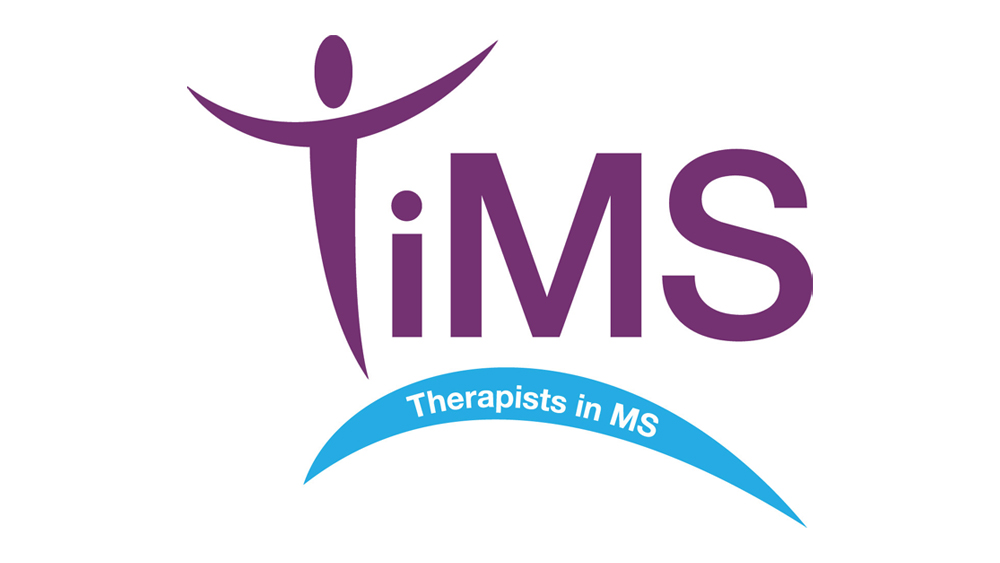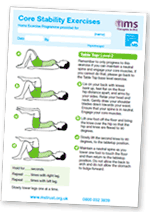Conference Presentations
TiMS has a range of MS health professional resources on topics like symptom management, self management and the latest equipment and technology.
1 min read
A resource developed by TiMS (Therapists in MS)

MS can affect balance and mobility in a number of ways, causing difficulty with everyday activities such as carrying a drink while walking, climbing stairs or maintaining balance while reaching.
One element of balance is the ability to maintain a steady trunk whilst moving a limb. When we reach out an arm or take a step to walk, our nervous system switches on our muscles in a specific order, with trunk muscles contracting before limb muscles. This stabilises the body, ensuring that we are not pulled off balance by the moving arm or leg. This trunk steadiness is commonly known as 'core stability'. Training programmes, such as Pilates, exercise the 'core' muscles in a precise controlled manner with the aim of improving trunk stability.

Download the core stability exercises (PDF, 8Mb)
These exercises are reproduced from a research study supported and facilitated by TiMS (Therapists in MS), with funding from the MS Trust.
With thanks to:
An innovative approach to research was undertaken wherein members of the research group developed and implemented a series of single case studies to explore the effectiveness of core stability training in people with MS with moderate disability levels. The research group facilitated by the MS Trust, co-ordinated 5 physiotherapists from 5 UK centres to each undertake 2 single case studies. A standardised study protocol, training days, and ongoing support and guidance to the local novice researchers was provided throughout the research process.
Eight individuals with stable MS, who could walk independently with or without unilateral assistance, were recruited for the project. The intervention comprised of 16 face-to-face individualised sessions lasting approximately 30 minutes. The sessions were delivered twice per week over an 8-week period, by a specialist neurological physiotherapist with experience in the delivery of core stability training to people with MS. In addition, participants carried out an individualised daily 15-minute home exercise programme. You can view the core stability exercises (PDF, 8MB) used but they should only be used by and with the supervision of a suitably qualified physiotherapist.
The basket, which is comprised of 10 exercises, was generated by specialist neurological physiotherapists through a consensus process. The exercises are designed to be appropriate for adults who can walk independently with or without use of unilateral assistance such as walking stick or orthotic brace. In the study the physiotherapists selected specific exercises from the exercise basket following a detailed assessment of each individual. Stretching was undertaken prior to or during these exercises to address any mal-alignments. Where necessary, in the first instance, clinicians facilitated the movements with a "hands on" approach, progressing to a "hands off" approach. Activation of transversus abdominis, in neutral spinal alignment, was required for each starting position. Each participant received a workbook with written and diagrammatic instructions describing their home exercise programme. Exercises were progressed, or new ones chosen, in response to the abilities of the individual over the 8 week intervention period.
The results showed visual analysis of trend, level and slope demonstrated improvement in five subjects (62%) in seven measures. This was confirmed by the two standard deviation band method of analysis for six measures. Analysis of group data (repeated measures within subjects analysis of variance) indicated significant improvement between baseline and intervention phases for timed walk (p = 0.019), MSWS-12 Scale (p = 0.041), forward (p = 0.015) and lateral reach (p = 0.012). In general, no further improvements were made following withdrawal of the intervention.
In August 2010 the abstract: The effect of core stability training on balance and mobility in ambulant individuals with multiple sclerosis: a multi-centre series of single case studies was published in the Multiple Sclerosis Journal. A description and evaluation of the process was also presented both at the MS Trust Annual Conference in 2009, and at The Chartered Society of Physiotherapy in 2010, you can view the presentation here.